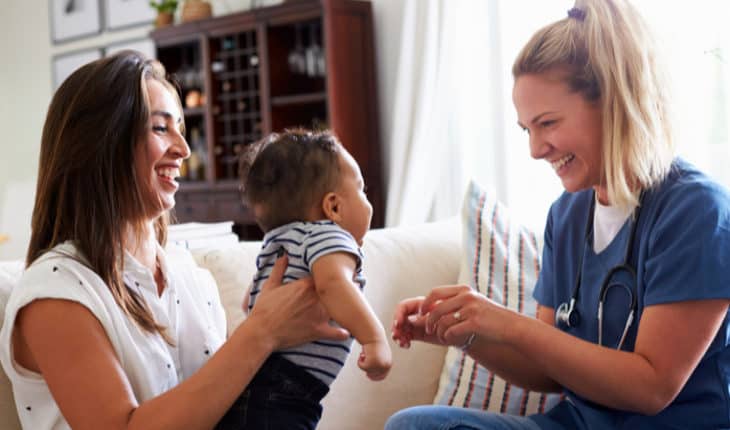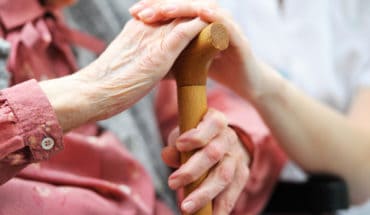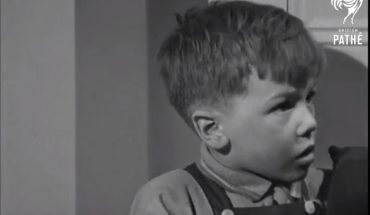New research has shown disadvantaged mothers’ mental health and wellbeing improved after regular maternal and child health nurse home visits during pregnancy, continuing up until the child turned two.
The study, led by the Murdoch Children’s Research Institute (MCRI) and published in Pediatrics, found the benefits from maternal and child health nurse visits to new mothers were still evident a year after the home check-ins ended.
A team of Australian researchers has created a new early intervention program, right@home, designed for mothers experiencing adversity to help develop their parenting skills such as feeding, bonding and creating a better home learning environment. Data shows one in five Australian children are born into disadvantage.
MCRI Professor Sharon Goldfeld said nurse home visiting programs could address inequities in maternal mental health, and subsequently improve children’s development.
“Given the crucial role that maternal mental health plays in the overall health of mothers and their children, addressing inequities generates substantial societal and mental health benefits,” she said.
“The most efficient and equitable approach is to integrate mental health care into existing maternal and child health services, focusing on prevention and early intervention.”
The right@home program was the largest multi-site randomised controlled trial of a nurse home visit program in Australia. It involved 722 women recruited from child and family health services at 10 hospitals across Victoria and Tasmania.
The intervention group, who received 25 home visits up until the child turned two, reported lower rates of depression, anxiety and stress and better wellbeing one year after the visits ended, compared to those who received the standard free centre-based nurse consultations in Victoria (nine visits) and Tasmania (six visits).
Professor Goldfeld said it was critical and timely to embed the program into existing services, as the COVID-19 pandemic had increased the economic and psychosocial stressors for families with young children.
“Mothers experiencing social adversities such as relationship difficulties, social isolation, unemployment and low educational attainment are at higher risk of poorer mental health,” Professor Goldfeld said. “The COVID-19 pandemic is likely to put these mothers at even greater risk.”
Global data suggests 9-16 per cent of women experience depression and 10-15 per cent experience an anxiety disorder in the perinatal period.
“Our study showed mothers just receiving the standard nurse care reported worse mental health symptoms two to three years after giving birth. The right@home program could have prevented or postponed this decline in mental health,” she said.
Mum Carla Bonacci, who joined the program a week before her daughter, Carlisseia, was born, said she would have struggled without the regular home nurse visits.
“I really needed the support, especially during the first few months after giving birth,” she said. “The nurses guided me through from helping with feeding and bonding to managing my daughter’s sleep.
“Being a single, first-time mum, I wasn’t confident but they gave me that reassurance, which has greatly helped my mental health and allowed me to be the best mum I can be.”
Professor Goldfeld said as the program was easily incorporated into the existing maternal and child health nursing system, which was where it had been tested, state governments should make it routinely available to vulnerable families.
“We do not want babies born into adversity to be on a pathway where they are unlikely to catch up with their peers,” she said. “Everyone should have the opportunity to raise happy, thriving children who are more likely to do better in school, have good relationships in the community, and lead healthier lives.”
The right@home is a research collaboration between the Australian Research Alliance for Children and Youth (ARACY), the Translational Research and Social Innovation (TReSI) Group at Western Sydney University and the Centre for Community Child Health, which is a department of The Royal Children’s Hospital and a research group at MCRI.
Researchers from The Royal Children’s Hospital, the University of Melbourne, Deakin University, ARACY and Western Sydney University also contributed to the study.
Publication: Sharon Goldfeld, Hannah Bryson, Fiona Mensah, Lisa Gold, Francesca Orsini, Susan Perlen, Anna Price, Harriet Hiscock, Anneke Grobler, Penelope Dakin, Tracey Bruce, Diana Harris and Lynn Kemp. ‘Nurse Home Visiting and Maternal Mental Health: 3-Year Follow-Up of a Randomized Trial,’ Pediatrics. DOI: 10.1542/peds.2020-025361
*The content of this communication is the sole responsibility of MCRI and does not reflect the views of the NHMRC.
- Gut microbiome could delay onset of type 1 diabetes - 3rd April 2025
- The da Vinci 5 Robot Is Set To Transform Bariatric Care: - 31st March 2025
- Beyond money: the hidden drivers fuelling child food insecurity - 31st March 2025






